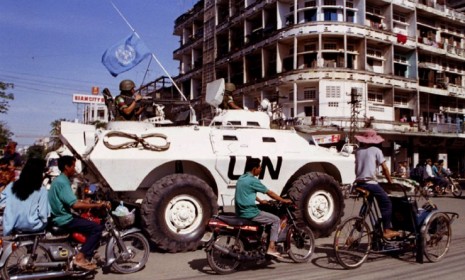Forget Syria: 5 cases where the U.N. wasn't impotent
The U.N.'s condemnation of Syria won't force Bashar al-Assad to end his bloody crackdown. But that doesn't mean the U.N. is always toothless

A free daily email with the biggest news stories of the day – and the best features from TheWeek.com
You are now subscribed
Your newsletter sign-up was successful
It's easy to see why impatient critics are bemoaning the United Nations. The U.N. General Assembly passed a resolution Thursday condemning Syrian President Bashar al-Assad for human rights abuses, and backing Arab League efforts to end the country's deadly attacks on anti-Assad rebels and protesters. But the measure is non-binding — it "lacks bite," says Bloomberg. Couple that with Russia and China's veto of a stronger Security Council resolution aiming to force Assad to surrender power, and it's clear why commentators are calling the U.N. irrelevant. But the U.N. isn't always ineffective. Here, a sampling of five cases where the much-maligned international body truly made a difference:
1. Libya
A year ago, protests broke out in Libya, triggering a bloody civil war. The country's longtime leader, Moammar Gadhafi, tried to stamp out the opposition. The U.N. Security Council imposed a no-fly zone, which provided the air support rebels needed to topple the regime. That initiative was at least a qualified success, says Britain's Telegraph. Today, "Libya has published its final draft of the country's election law," giving a voice to a "vibrant mix" of political parties banned under the late Gadhafi's rule.
The Week
Escape your echo chamber. Get the facts behind the news, plus analysis from multiple perspectives.

Sign up for The Week's Free Newsletters
From our morning news briefing to a weekly Good News Newsletter, get the best of The Week delivered directly to your inbox.
From our morning news briefing to a weekly Good News Newsletter, get the best of The Week delivered directly to your inbox.
2. Tsunami relief
The U.N.'s vast humanitarian operation has the resources to spring into action in crisis. Within 48 hours of the 2004 Indian Ocean tsunami, the U.N. had food, clean drinking water, and vaccines on the ground, eventually reaching millions of people in the 12 hardest hit countries. The relief effort was made possible, says the Better World Campaign, because the U.N. has a network of agencies doing a "vast array of day-to-day work that dramatically improves people’s lives around the world."
3. Cyprus
"For close to four decades, Cyprus has been one of the most troublesome problems faced by the United Nations," says Nathan Morley at Voice of America. The former Greek colony was split in two in 1974, when Turkey invaded the northern part of the Mediterranean island. A U.N. peacekeeping force has enforced a buffer zone for decades, allowing diplomats to try to coax the officially recognized government, which controls the southern two-thirds of the island, and the Turkish Republic of Northern Cyprus, recognized only by Turkey, to reunite.
A free daily email with the biggest news stories of the day – and the best features from TheWeek.com
4. Cambodia
The U.N.'s peace mission in war-ravaged Cambodia had its critics, Elizabeth Becker said 17 years ago in The New York Times. Some said it was "too costly," and left behind still-impoverished peasants and a government still rife with corruption. Others said it was ineffective because it didn't entirely get rid of the Khmer Rouge. But "what's forgotten is what moved the U.N. to mount the plan: Two decades of war [and] destruction of society by the Khmer Rouge, who caused one million deaths and massacred intellectuals, creating one of the world's lowest literacy rates." The U.N. mission led to the 1991 Paris peace plan — which "worked, however imperfectly. It ended the war, brought 350,000 refugees home and set up democratic elections, in which 90 percent of the population voted."
5. Korea
After World War II, the Korean Peninsula (which had been under Japanese control) was split into two parts: the Soviet-backed North, and the U.S.-backed South. In 1950, the North invaded the South, and the Security Council promptly authorized sending Western troops to fight with South Korea. "It was in Korea that the U.N. first authorized the use of force in the name of collective security," says American Military and Naval History. When the fighting ended in 1953, South Korea's security was assured, and a buffer zone that still exists was established.
-
 Corruption: The spy sheikh and the president
Corruption: The spy sheikh and the presidentFeature Trump is at the center of another scandal
-
 Putin’s shadow war
Putin’s shadow warFeature The Kremlin is waging a campaign of sabotage and subversion against Ukraine’s allies in the West
-
 Media: Why did Bezos gut ‘The Washington Post’?
Media: Why did Bezos gut ‘The Washington Post’?Feature Possibilities include to curry favor with Trump or to try to end financial losses